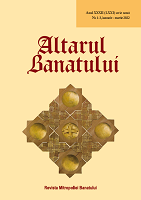DE LA GNOSTICISMUL DIN PERIOADA PATRISTICĂ LA NEO-GNOSTICISMUL CONTEMPORAN
FROM PATRISTIC PERIOD GNOSTICISM TO CONTEMPORARY NEO-GNOSTICISM
Author(s): Teofan MadaSubject(s): Theology and Religion, History of Religion
Published by: Mitropolia Banatului
Keywords: gnosis; dualism; pseudo-religiosity; gnostic dyad; gnosticism; complete humanity;
Summary/Abstract: Salvation for Gnosticism does not involve the dynamics of asceticism and the assumption of the Cross over time, the confession of the Orthodox faith as an act of trust in the presence and work of the Holy Trinity to recover its fallen creation. The Gnostic demands and wants instead an immediate look at the work of life inside the cosmos, a decisive indication that deciphers the riddles of heaven and earth. The concept of ‘gnostic‘ comes from gnosis, a word that in Greek means knowledge and that comes to designate those people who believed they possessed the true saving ‘knowledge‘ that would bring both redemption and redemption. We should note that there are categorical differences within the different Gnostic groups that differ not only in enigmatic statements but also in an overwhelming diversity of expression and conceptions. There are two sources of information for christian gnosticism: the first and most important is the writings of the Church Fathers, who are the Church‘s apologists against Gnostic groups because of their different teachings, beliefs, and practices. These writings are often a slander of christian gnostics in many ways. The second source of information is that of the Gnostic writings that provoke the performer unexpectedly for a long time, because these writings are particularly enigmatic and complex, being extremely difficult to recover the original intention and meaning. After all, these texts were designed for the ‘chosen‘ or those who possessed special knowledge and held the key to deciphering esoteric statements, as well as those present in the Gnostic literature as far as can be found.
Journal: Altarul Banatului
- Issue Year: XXXII/2021
- Issue No: 7-9
- Page Range: 42-53
- Page Count: 12
- Language: Romanian

